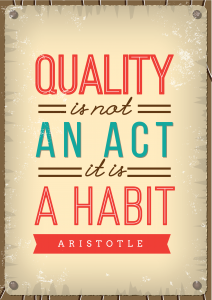Habits for Nursing School Success

These habits to help you hack nursing school will be valuable for success in school and when you start your career as a nurse.
Quality is a Habit
Aristotle anticipated the findings of modern behavioral science when he said, “We are what we repeatedly do. Excellence, then, is not an act, but a habit.” Everything we do from safe driving to productive study, depends on our ability to develop good habits.

The Power of Habit
In Charles Duhigg’s excellent book The Power of Habit, he reveals that every habit has three basic components:
A cue – if you’ve become a good driver you automatically look left and right when you come to a stop sign. The stop sign serves as your cue.
A behavior – looking both ways is the behavior. You probably had this drilled into you when you were a child learning to cross the street.
A reward – the reward is a proceeding confidently. If you’ve ever forgotten, and almost hit a pedestrian or had someone honk at you, you know there is also a potential penalty.
To develop good habits, the key is to develop cues to trigger good behaviors and the right rewards to reinforce them. In the habits below, possible cues and rewards will be suggested.
1. Use nursing school as a coach to develop good habits
You can see nursing school as an obstacle to getting past becoming a nurse. Or, you can see it as an opportunity to develop lifelong habits that will serve you in every area of life. Either way, you’ll become a nurse. But if you go with the second, at the end of it you’ll also be a better nurse and person.
2. Find a place that cues you to productive study
Try to find an area where you study and do little else. This might be a cubicle in the library that shields you from distraction. Or it might mean a place in your home away from the TV. If you consistently use it as a place to study, the very act of going there will cue your brain to concentrate. If you decide to check social media, or take a phone call, get up and walk away. Then, when you return, you’ll again be cued to study.
3. Set realistic goals and define rewards
Begin your study time by making a list of what you want to do. Make it reasonable or it will just discourage you. Break the tasks up into half-hour chunks, or whatever you can handle. Then set a timer on your phone and go to it. When the timer goes off, give yourself a reward you’ve determined in advance. It might mean 10 minutes of calling or texting a friend. Or it might mean a stretch break. As you make your way through the list, cross off each item. That little act is its own potent reward.
4. Do the hard things first
When you make your list, put the hard things first. If you don’t you’ll be tempted to procrastinate because you know the most difficult tasks are still ahead. Do the hard jobs when you are still fresh and the satisfaction of having them out of the way will help you tackle the easy ones.
5. Join a study group
Assign each member of the group an area to summarize for an upcoming test. This forces you to study something in-depth before the test and gives you helpful summaries of the rest of the material. When you get together, enjoy the social interaction. But also use the time to ask questions about the summaries, give each other tips on what might be on the test, and quiz each other on key questions. At their best, study groups divide and conquer difficult assignments and tests.
6. Master the game of D&D (drugs and diseases)
If you can learn the important drugs and diseases early on, clinicals will be easier and class information will make more sense if you have these fundamentals in place. Consider getting something like Mosby’s Pharmacology or Pathophysiology Memory NoteCards. They provide mnemonic devices to help you remember the information long-term. Develop the habit of spending five minutes a day on each of them. If you do that, not only will you get better grades, you’ll approach the NCLEX with more confidence. And also, you’ll carry the information into practice and provide better care for your patients!
7. Block out “school hours”
If you are in a residential program, treat the time in between classes as study time. Hit the library early in the term and develop the habit of daily study. You can procrastinate and stay up late before exams or papers, but that will take its toll on your body and you won’t remember the information long-term. If you are in an online program, figure out a time that you “go in to work” at your designated study space, and remember you are paying for school. Get your money’s worth! If you are diligent about this, just sitting in your workspace at the appointed time will put you in the zone and you’ll find yourself better able to focus.
8. Listen to nursing podcasts
if you are short on time, one way to double up is to listen to educational podcasts on your commute or while you exercise. Podcasts can impart hardcore information or provide lighter information about various nursing jobs, news, and popular health topics. There are podcasts designed to help you retain your passion for nursing and give you the vision to keep at it. Check here for a list of popular nursing podcasts.
9. Make good use of in-class time
Not all classes are super-interesting, and it’s easy to surf the internet during lectures or tune out. But if you find a way of staying engaged, your brain will store the information and you won’t need to study as much later. Don’t try to capture every word while note-taking. It is impossible (for most people at least!) and your brain disengages from the content. Try to summarize the information presented. That way your brain has to think about it and figure out what is important. If a lecture is boring, try to figure out how the material might affect your practice. If you can’t figure it out, ask that as a question. A question will make things more interesting for you and for everyone else.
10. Find people that you can help, and that can help you
People do better at developing habits in groups. This is part of the secret of groups like AA. If you reach out to the pathophysiology whiz kid for help, she’ll probably take it as a compliment and as you get together with her, her proficiency at the topic (and hopefully her good habits) will inspire you. Similarly, if you try to help someone who is struggling, it will motivate you to master the material yourself. The social contact, and the reward of seeing others’ gratitude, will reinforce your own commitment to learning.
11. Examine failure with a compassionate curiosity
Whatever your failure is—whether it be wasting hours on social media or getting a poor exam grade—don’t beat yourself up over it. The resulting bad feelings will set you up to medicate your feelings with distraction or worse. Instead, think about the cues that caused you to do something other than study productively. Then think about the rewards the behavior got you. Is there a way to substitute a better behavior and still get the rewards? If the isolation of the study cubicle drove you to social media, could you study with someone else and both learn the material and get social contact? If the tedium of pharmacology made you turn on the TV, is there a way to make a game out of studying medications so that it keeps your interest?
12. Treat professors as coaches
Most professors want to do more than dispense information, they want to see you succeed. If you are struggling in a class, approach the professor early and ask for help. Explain what you’ve been doing to learn the material and ask for input. How have other students done well at this? How should you best focus your study time? Generally, you’ll experience the reward of walking away with a better study game plan and a better relationship with your professor.
13. Celebrate your successes
It is well documented that humans focus on negative feedback more than on the positive. A compliment from a friend might give you a five-minute bliss buzz, but if he insults you, you’ll probably be thinking about it all week. When you fail a quiz or forget a deadline, your stress level will go up and you’ll be tempted to cope in unhealthy ways. So make sure to notice your successes. If you got a good grade, what worked? If you didn’t procrastinate on your paper, what helped? Notice those things and make a habit of them. And then, buy yourself that super smoothie as a reward and savor it!
14. Focus on one crucial habit
Charles Duhigg in his book The Power of Habit, notices that often there is one “keystone” habit (the “keystone” is the stone at the top of an arch that keeps it all together) which helps everything else work out. It may be as simple as the habit of getting up on time. If you do that, the rest of your day — exercise, study, work, and relationships — may fall into place. Getting up on time involves all kinds of things: putting the alarm clock out of reach (your cue!), getting to bed on time, and exercising in the morning so you can fall asleep at night. List all the factors so that you make it happen. But sure to think about a reward for doing it. You might set the coffee pot timer so that a hot cup is waiting for you when you get up.
Perhaps the key habit for you is a daunting one. Maybe it is studying for three hours each day. Even so, the process is similar. Find a cue, account for all the related obstacles, and give yourself rewards. It can be anything from guilt-free video games to hip-hop dance.
15. Singletask
In places like the library students might be injecting music into their auditory canals, vibrating their sensory neurons with their phones, gorging their optic nerves on Twitter pixels, and “studying.” But not well or efficiently. A study by Stanford researchers showed that multitaskers perform worse at storing and organizing information and develop an addiction to distraction. So be careful about trying to do a lot at once. Focus on your reading or writing. You’ll find that single-tasking will get you better grades and you’ll spend less time studying. If you study productively, it will feel like its own reward.
16. Cut out distractions
This is advanced single-tasking. Your retention of material depends on how well you can concentrate. If you can handle it, mute your phone. For laser concentration, consider turning off your wireless or using an app like Freedom to block distracting websites. Work hard for a set amount of time. Start off with short increments and then give yourself a social media or phone call reward. Increase the duration of the time and soon your brain will be dosing you with dopamine hits as a reward for your productivity.
17. Don’t let failures throw you off your game
In one study, it was found that habits can take anywhere from 18 to 254 days, with an average of 66 days, to form. The good news was that occasional lapses did not prevent the development of a new habit. Set some calendar reminders on your phone to evaluate how you are doing. If one pops up and you haven’t been doing the behavior, don’t just dismiss it. Did you aim for more than is realistic? If so, adjust your goal. Is it that you need a more definite cue? A more motivating reward? Think of it as a game in which you get as many turns as you need to win.

18. Build exercise into your routine
in the busyness of school, exercise can be hard to get. But if you neglect it too long, you’ll pay the price in terms of concentration, mood, and energy. As a cue, download a smartphone app that tells you how much you walk each day. When you pick up your flashcards, pace rather than flop on the couch. Consider parking off-campus so you have to walk half a mile each school day. Take a yoga class with a friend. Find some way of building exercise into your schedule so that it doesn’t disappear as the demands of each school term increase. Find the right kind of exercise for you and the feeling you get from it will reinforce it.
19. Tell someone else the habit you are trying to develop
Peer pressure is a thing, and it doesn’t have to be bad. As behavioral experiments have revealed, people do better at study tasks when they make their goals known to others. Let someone know what you hope to do and tell them when you are going to check in. Knowing that the check-in is coming up will inspire you and serve as a cue to keep at it. If possible, do it with a friend who also sets goals. Agree that you’ll buy the other lunch if one of you doesn’t meet the goal. As the studies show, friendly competition may accomplish far more than whipping up your willpower.
20. Give yourself a “Sabbath” rest
If you don’t have “off” time it will be hard to have “on” time. If you never get break time, the temptation will be to take extended breaks during studying. But those breaks won’t feel as refreshing as a solid chunk of re-creation. One of the burdens of school is that there is always more work you could be doing. Set aside four to eight hours in which you don’t stress about, or do, any schoolwork. Be proactive about how you use the time. Get into nature, have a meal with friends, read a good book, go to your house of worship, play ultimate Frisbee—anything that feeds your humanity and opens you to the joy of being alive. Theologian Abraham Heschel calls Sabbath “a palace in time.” Practice intentional rest and keep your soul alive throughout the challenge of nursing school.
Related:
- Dual Major Options for Nursing Students
- Essential Guide to Nursing Licensure Compact (NLC)
- How Are We Solving the Nursing Shortage?
- How Do I Become An RN?
- How Does RN Licensing Work from State to State?
- How Does Technology Impact Nursing?
- 10 Highest Demand Areas for Nursing Shortage By State
- 25 Nurses on TV We Would Love to Work With






